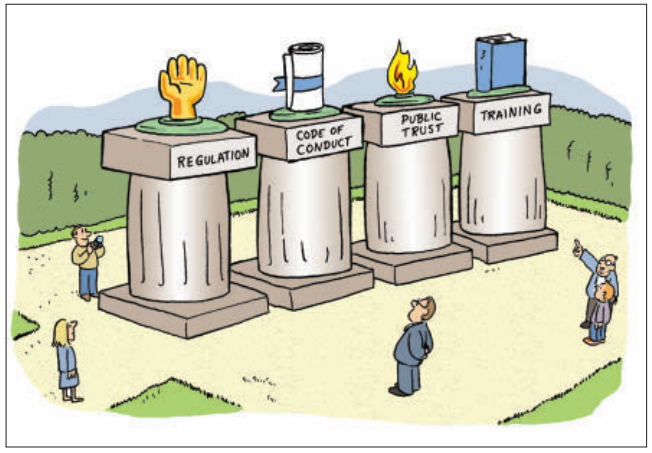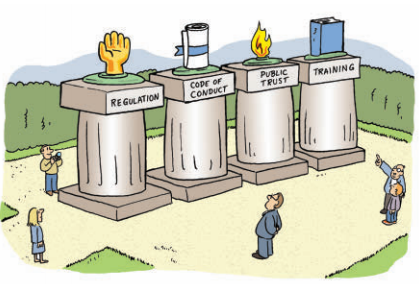WHAT DO YOU THINK OF when you hear the word “profession”? I would guess that you quickly came up with doctors, lawyers, and actuaries. I generally think of four aspects of one’s work when I consider whether that person is part of a profession:
- Specialized and rigorous training
- Public interest and trust
- Code of conduct
- Regulation
In this article, I am going to focus on aspects 3 and 4 above, since most readers will be very familiar with the training and public interest facets of an actuary’s work.
A Profession Has a Code of Conduct
The Code of Professional Conduct was adopted by all five U.S.-based actuarial organizations, effective Jan. 1, 2001. The Code of Professional Conduct applies to members of all of these organizations, and helps us understand what it means to be a professional. In fact, the Code itself says it best: “The Precepts of the Code identify the professional and ethical standards with which an Actuary must comply in order to fulfill the Actuary’s responsibility to the public and to the actuarial profession. The Annotations provide additional explanatory, educational, and advisory material on how the Precepts are to be interpreted and applied.”

Generally, when the Actuarial Board for Counseling and Discipline (ABCD) receives a complaint, it is from an actuary seeking to fulfill his or her obligations under Precept 13. Precept 13 has been explored in depth previously in this column (see, for example, John Purple’s article “Owning Precept 13” in Contingencies, May/June 2014) and is a frequent topic in webinars and local meetings. The Academy’s Council on Professionalism also has published a discussion paper on Precept 13 that is available on the Academy’s website. In short, this Precept requires each of us to be conscious at all times of the professional behavior of other actuaries and to bring any potential material violations to the attention of that other actuary. And if resolution is not reached or if such a conversation does not take place, an actuary is required to disclose the potential violation to the ABCD, except where the disclosure would be contrary to law or would divulge confidential information. According to the recently released 2014 Annual Report of the ABCD, the Board dealt with such inquiries 47 times during 2014. This is where we begin to enter the self-regulating aspect of a profession mentioned above.
A Profession Is Regulated
The ABCD, the Joint Discipline Council, and the discipline committees of the individual membership organizations may all play a role here. Complaints may be dismissed early in the process, if the ABCD chairpersons do not believe there is a possible material violation. The complaint may also be dismissed at other points along the way. Those that are not dismissed will generally go to a hearing, where the subject actuary, the investigator, and the full ABCD review all the evidence.
If the ABCD believes that discipline is warranted, the case will go to the subject actuary’s member organization(s), which may then forward the case to the Joint Discipline Council (JDC). If a JDC panel determines that there was a material violation and the discipline is suspension of more than two years, the individual organizations’ discipline committees will also be involved. (My intention here is not to go through all the details of the process but to impress upon all actuaries and other interested parties that the process is fair, has substantial cross-functional representation as well as deep subject matter expertise, and that the process does a good job of balancing the interests of the public we serve with the privacy that we owe actuaries while this process is going on.)
Former ABCD chairperson Bob Rietz stated in the ABCD’s 2014 Annual Report, “Actuaries have a well-deserved reputation for integrity and expertise, and the discipline process is one tool that helps maintain that reputation.”
Professionalism and Continuing Education
While the discipline process discussed above is important as a way of dealing with the most serious violations of our Code of Professional Conduct, most members of the profession will never have to be involved in that process. Nonetheless, actuaries are demonstrating professionalism, integrity, and competence every day. Most members of the Academy will need to comply with the General Qualification Standard, which requires 30 hours per year of continuing education, including a minimum of three hours on professionalism topics. This yearly requirement demonstrates our profession’s dedication to appropriate standards of practice and self-regulation.
It is relatively easy for everyone to get the three professionalism hours, given the numerous seminars and meetings offered. ABCD members alone participated in 10 presentations and several webinars last year. All around the United States, individual companies, local actuarial clubs, and all five of the U.S.-based actuarial organizations offer programs on professionalism. So while it is not difficult to get your three hours, you do have to be intentional about this—just as intentional as you are about maintaining your expertise in the more technical aspects of your work.
Informal Help—Requests for Guidance
According to the ABCD’s 2014 Annual Report, at least 90 times in 2014, actuaries used the process of a Request for Guidance (RFG). Generally, in these cases, the member is asking, informally, for a member of the ABCD to help the actuary think through a particular situation. This may involve the work of another actuary, in which case the Request for Guidance sometimes escalates into a complaint. More often, these RFGs focus on the actuary’s own work. He or she has been asked to do something that does not quite feel right. Or the actuary wants an opinion on whether he or she has satisfied technical requirements for qualification. Often, it seems, the actuary is looking for validation of concerns before taking them to management. In any case, these RFGs represent another way that the profession is demonstrating its support for the quality and expertise of actuarial work done in the U.S.
Who Cares About Professionalism?
By all indications, nearly everyone in the actuarial world. From the first exam where an actuary signs a candidate code of conduct to an officially retired but still practicing actuary listening in on a webinar, and in all of the courses, meetings, and daily interactions in between, actuaries are demonstrating our commitment to professionalism and showing that we deserve the trust of the public we serve.
NANCY BEHRENS is a member of the Actuarial Board for Counseling and Discipline.

